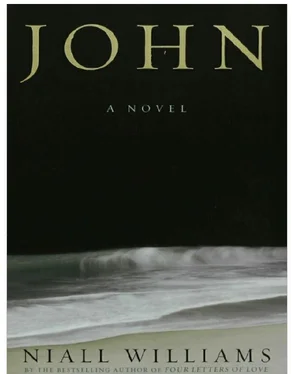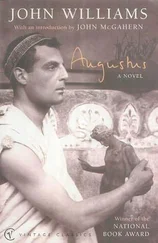They have no words. They help the Apostle to take rest on a stone step by a closed doorway then arrange themselves thereabouts in rumpled disquiet.
It is not to be as they had imagined.
They sit without speaking, a broken urn of expectation between them.
So they are come.
They are come even as the soothsayer that Auster met foretold. The troubled moon she saw is they very same darkness they bring. Here to our beginning, to the glory of the One, they bring their clouded ignorance. Credulous fools, lamb followers of an old man who follows a younger one who is dead. The doctrine of a ghost. Preachings of vagueness and confusion. Doors, sheep, bread. How do they imagine to have followers? They know nothing of this new world. They are themselves without clarity or understanding.
All is mystery, O indeed. Indeed to them it is. They who drink the blood and eat the body of their ghost.
Savage their practice, outlandish their creed, will be the cry.
I know. None knows better than I.
I who before was blind and now see.
They will be despised and jeered and then in their tediousness ignored.
But still.
But still, with the imperfect knowledge of the plebeian, they will darken us. By existing they besmirch the true Divine. In the dim mind of the commonality there will be confusion. There will. In the muddied perception, the Christians, with their preaching of the Light of the World, will seem little different to our truth.
This is the very word of the fortune-teller. The portent: the moon fighting to be free of cloud.
For true light to shine, she must vanquish them.
Verily.
So, they are come.
I will pray. I will pray for strength, that through me the light of the One may blind them into darkness and oblivion.
I will tell Auster to warn Diotrephes they are come. They will seek him out, thinking he a follower.
Let them.
The Apostle and the disciples sit in the shaded street. In silence they compose themselves.
The day well past the noon, Papias asks, 'Whither should we go, Master?' His voice is quiet. In the interim since they left the marketplace he has had to remake his hope. The repaired fracture is frail. 'Should I go and seek for lodging?' he asks.
'We will all go, Papias,' John says.
'But we draw attention to ourselves, perhaps it is better if Papias alone goes,' Danil offers.
'Or I will go with him,' Lemuel says. 'We will find some place and come back for you.'
'It may be safer,' Danil agrees.
Though these two are as old soldiers in the face of unknown opposition, their anxiety is sharp and clear. It is not for themselves they fear, but for the treasure beyond calculation that is the Apostle. Though they do not word it so, all are aware of how vulnerable he is, and so, too, how their community takes its meaning from him. The world is a threat. It is not something any have considered, that in the quotidian will be peril and from it they must shield him.
They exchange looks across him.
'We will all go,' John says, and presses his hands upon his knees to rise. 'The Holy Spirit guides us. Be not afraid.'
He stands amongst them, his demeanour serene, his face upheld as is become his way.
'But in which direction do we go, Master?' Papias asks the blind man.
'We go towards the quarter of the city where I once lived,'John says. 'It is to the south of here not far.'
He takes the first steps as Papias gives him his arm, and they go once more.
It is not long later, walking into the warm sun that fills a broad thoroughfare, that the Apostle tells them they are there or thereabouts.
'Tell me,' he says to Papias, who describes for him then the stone dwellings, their porticoes and groves beyond.
'There is one a little withdrawn?' John asks.
'Yes, Master.'
'A low building facing the rising sun?'
'Yes, Master, I see it.'
'Lead me there.'
Papias does. The others pause at the entranceway while the Apostle is led on. He holds a hand out just before him. His thin fingers waver slightly as though in air he finds traces of himself years before. Here is where he lived once. Here is where Timothy lived after him. Here, too, where he heard Philip had once sojourned before travelling further into Asia. His lips press against each other as he approaches the doorway. There is a minor tremble in his chin.
He has no idea what he will meet, Papias thinks.
John's left hand is light upon his arm, his right extended.
Behind them, waiting, are the others. They watch intently, as if for revelation.
'Here, the door?'
'Yes, Master.'
And the right hand of the old blind man rises, fingers extended flatly, as if for an instant it calls halt to what fear or doubt traffics there or is raised upright to draw down the attention of one looking from above.
It rises and holds, and then thrice the old apostle bangs it on the door.
He stands without display of emotion. Papias looks to him and then at the door itself, bracing himself for rejection.
There is nothing. For a moment they are islanded so, awaiting the arrival of the Holy Spirit.
Then the door opens and one of the dark-haired daughters of Philip is standing there. She is a woman of more than two score years, her father already dead a long time. As she opens the door, around her come running her three children.
Her name is Martha. She knows John, having never met him. She knows him for the resemblance to her father, though Philip was more broad and full-haired. The resemblance is in the expression, in the eyes a light familiar.
'I am John, son of Zebedee, brother of James,' he says.
She brings her hands to her mouth. She has thought them all to be dead. She has thought hatred vanquished them all. At the sight of the Apostle she cannot speak. Her children hold to her robe. She allows for the miracle that is this old man before her to assemble. Then she says, 'Forgive me, come, welcome, welcome all.' She waves a hand to beckon forward the others standing by the entranceway. She tells the children to step back to allow the visitors. Papias bows his head to her. But she cannot yet fully comprehend what is happening and forgets her manner. Truly to her they are like ones from another kingdom, and their reality is at first no other than figures from a dream.
They come inside, a shy, quiet cluster in poor clothing. They appear nervous in the company of a woman.
With an urgent hospitality she tells them to sit. She tells them her name. When the disciples hear that she is the daughter of Philip, there is as a wave of light breaking in each.
'Philip,' John says.
'He is buried in Hierapolis in the province of Euphrates,' Martha tells him. 'My sisters also.'
'But you remained here?' Papias asks.
'With my husband, who died twelvemonth ago.'
She rises and brings them jugs of water. Her children follow her. 'Forgive me my poor welcome. You have had a long journey?'
'From Patmos. We have been living there in banishment and exile,' Meletios says softly, 'but come now for the glory of the Lord.'
She sits by the Apostle.
'You cannot see,' she says.
T see all that is,' he replies. 'You have kept the faith of your father.' His hand reaches out. She bows her head and his fingers alight upon her.
The small children watch with large eyes.
Though the house is small, they are welcomed to stay. They eat a supper of salted fish and bread. Martha names her children for them, Philip the eldest, and Mary and Ruth, and to them the mute boy makes faces until they laugh.
'If it please you, tell me of my father,' Martha asks.
And John does. His brow wrinkles momentarily. Whether the act of recall is painful or it is the substance of the memory, briefly his face is knotted. Then he touches his tongue to his pale lips and says, 'When Jesus was passing, he stopped and saw Philip and said, "Follow me."'
Читать дальше










